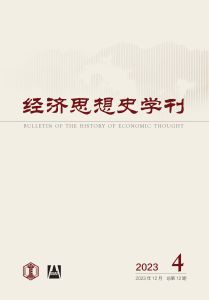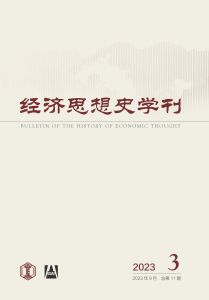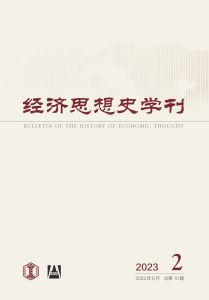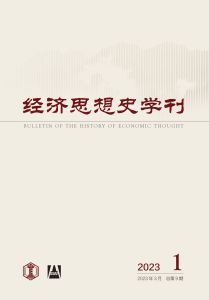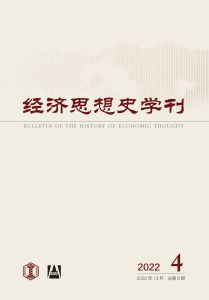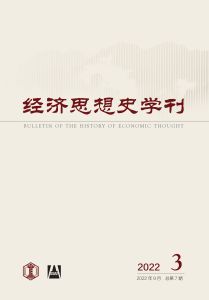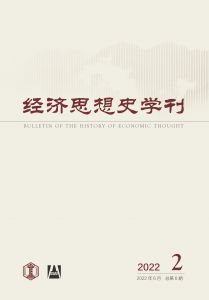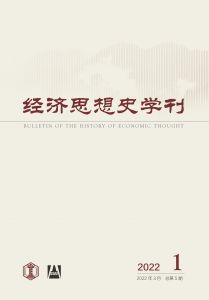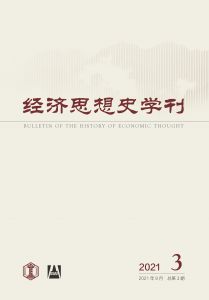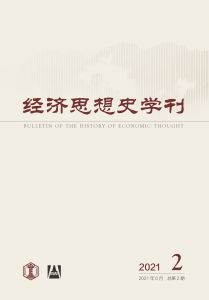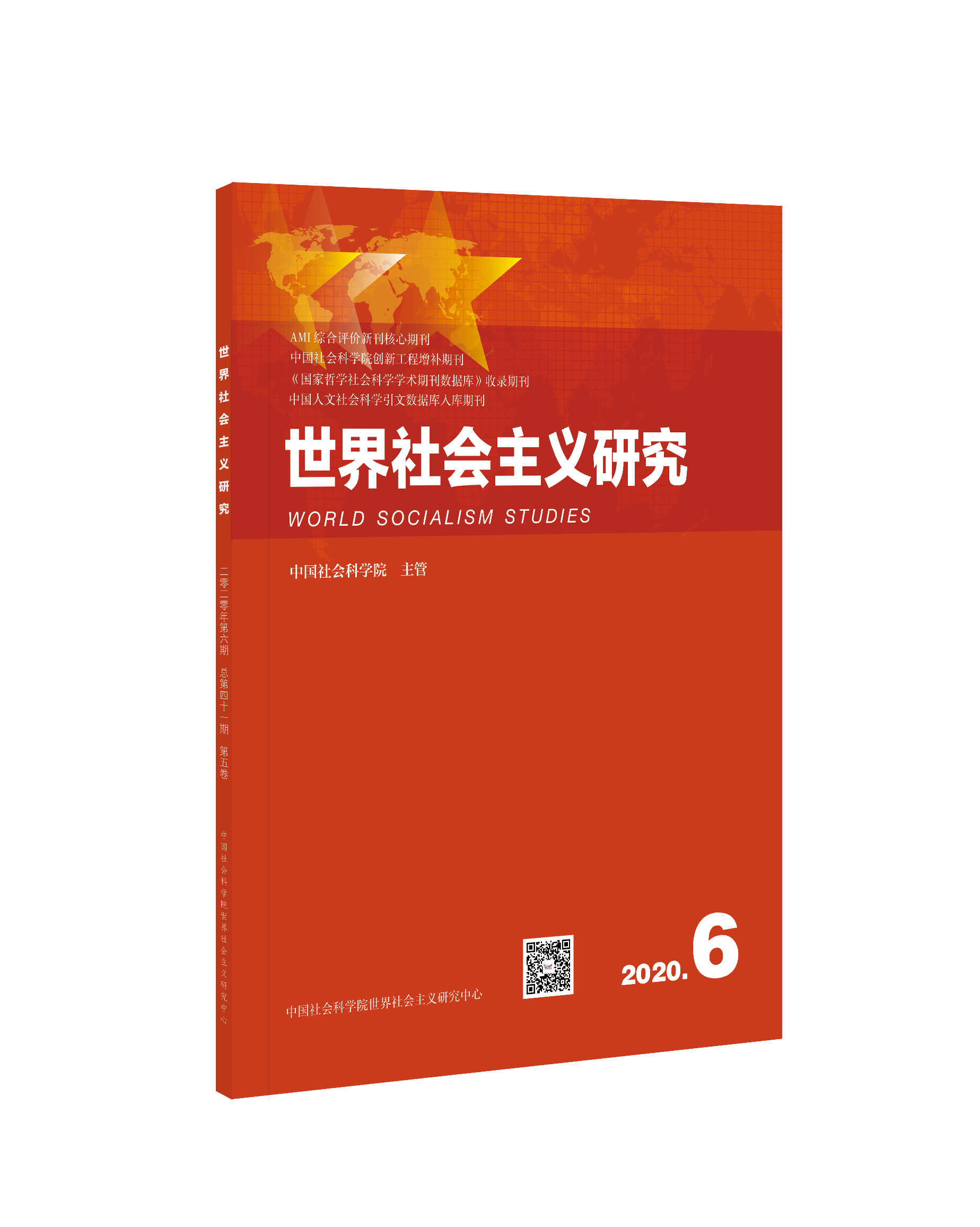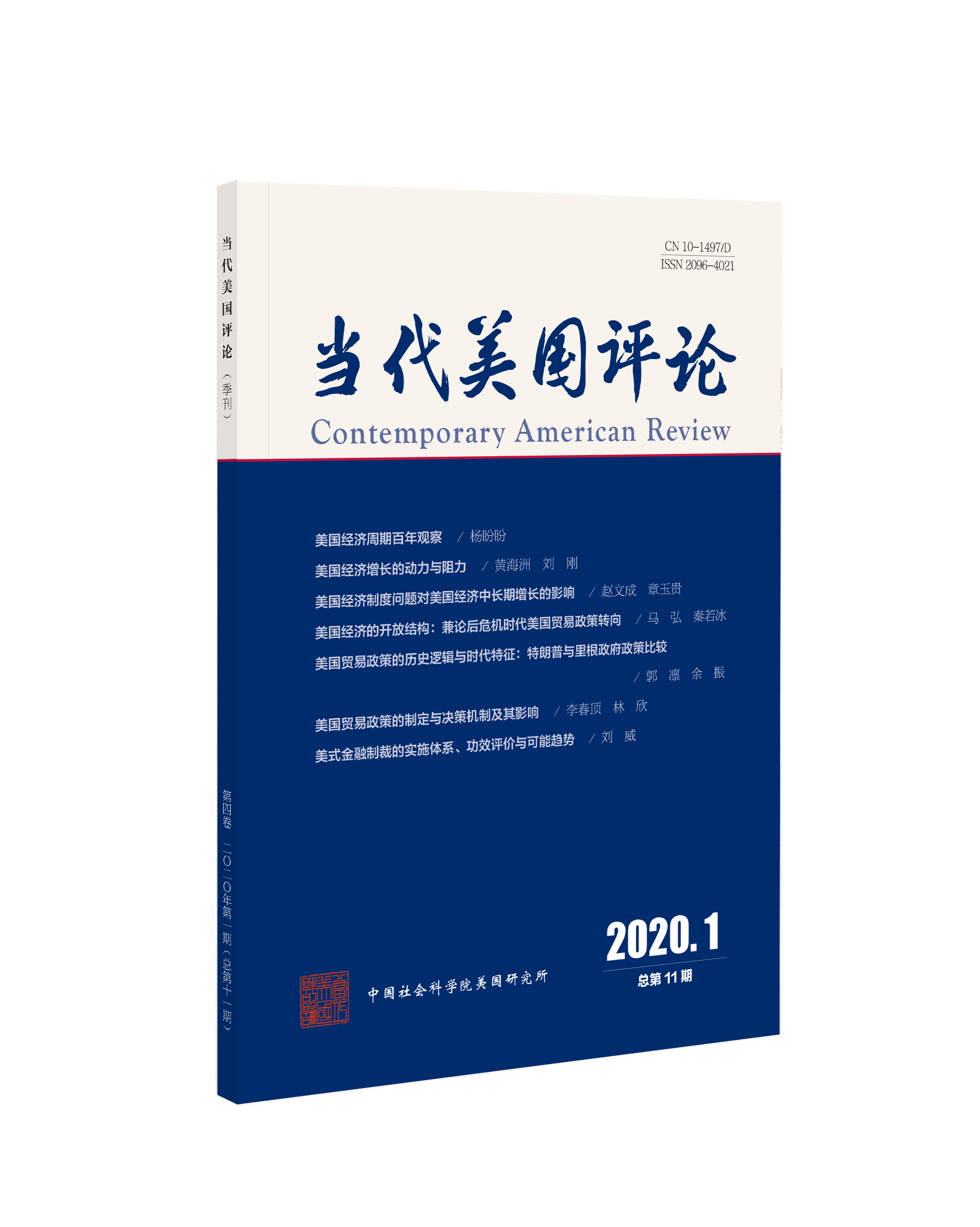最新期刊
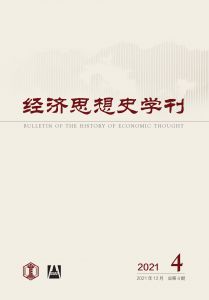
目录
过往期刊
参考文献
-
编辑委员会
-
以工代赈思想与实践的演进
-
一、减贫赈灾理论框架中的以工代赈
-
二、以工代赈的思想传统和历史实践
-
三、当代以工代赈理论与实践的发展
-
四、来自经济史和经济思想史的启示
-
-
改革开放制度变革特征与经济思想发展转型辨析
-
引言
-
一、改革开放准备阶段(1978—1983年)经济思想发展转型
-
二、有计划商品经济体制改革阶段(1984—1991年)经济思想发展转型
-
三、建立和完善社会主义市场经济体制改革阶段(1992—2011年)经济思想发展转型
-
四、全面深化改革加快完善社会主义市场经济体制改革阶段(2012年以来)经济思想发展转型
-
结语
-
-
集聚的现代性与均衡社会的准则
-
一、引言
-
二、集聚的现代性:四类机制与风险累积
-
三、均衡社会的四个准则
-
四、结论
-
-
“现代货币理论”政府发行货币支出思想分析
-
一、现代货币理论“政府发行货币支出”的思想
-
二、只有政府部门赤字,私人部门才有盈余吗?
-
三、政府财政赤字的积累带来什么?
-
四、政府赤字支出会导致货币发行吗?
-
五、中央银行独立性的本质是什么?
-
六、政府如何发行货币支出?
-
七、政府发行货币支出的界限在哪里?
-
八、简短的结论
-
-
博弈论制度分析的哲学基础
-
一、问题的提出:博弈论制度分析源流
-
二、大卫·刘易斯的学术影响
-
三、作为惯例的语言:简述刘易斯的惯例理论
-
四、反思经济学制度分析
-
五、结论
-
-
实证主义与经济思想史
-
一、引言
-
二、实证主义的遗产
-
三、经济学家的通识教育
-
四、经济学研究生培养
-
五、哈耶克认识到了实证主义的危害
-
六、充满希望的未来?
-
按年份浏览:
- 全部
- 2023
- 2022
- 2021
[1][1]卜凯,1936,《中国农家经济》(中国七省十七县二八六六田场之研究),张履鸾译,商务印书馆。
[2][2]蔡勤禹,2009,《传教士在近代中国的救灾思想与实践——以华洋义赈会为例》,《学术研究》第4期。
[3][3]程天宝,2009,《试论先秦时期的水灾与赈济》,《河南社会科学》第5期。
[4][4]崔艳红,2011,《论新中国建立以来我国政府防灾救灾思想的演变》,《岭南学刊》第3期。
[5][5]邓金河,2014,《探析建国初期内蒙古的以工代赈政策》,《呼伦贝尔学院学报》第1期。
[6][6]杜俊华,2010,《华洋义赈会与抗战前夕的四川旱灾救济》,《甘肃社会科学》第6期。
[7][7]杜润生,1994,《以工代赈与缓解贫困·序》,载朱玲、蒋中一《以工代赈与缓解贫困》,上海三联书店、上海人民出版社。
[8][8]国家发展和改革委员会,2021,《一图读懂〈全国“十四五”以工代赈工作方案〉》,https://www.ndrc.gov.cn/fggz/fgzy/xmtjd/202108/t20210813_1293543.html?code=&state=123,最后访问日期:2021年9月28日。
[9][9]国务院新闻办公室,2021,《中国的全面小康》,http://www.xinhuanet.com/politics/2021-09/28/c_1127910843.htm,最后访问日期:2021年9月28日。
[10][10]金陵大学农学院农业经济系,1932,《中华民国二十年水灾区域之经济调查》,金陵大学农学院印行,https://www.doc88.com/p-20799043481781.html,最后访问日期:2021年9月28日。
[11][11]李伯重,2002,《十八世纪中国的官僚制度和荒政》(书评),《读书》第10期。
[12][12]李文海、夏明方主编,2003,《中国荒政全书》第1辑,北京古籍出版社。
[13][13]刘招成,2003,《华洋义赈会的农村赈灾思想及其实践》,《中国农史》第3期。
[14][14]孟昭华,1999,《中国灾荒史记》,中国社会出版社。
[15][15]牛淑贞,2005,《试析18世纪中国实施工赈救荒的原因》,《内蒙古大学学报(人文社会科学版)》第4期。
[16][16]渠占辉、霍亚松,2005,《华洋义赈会赈灾防灾的实践飞跃及意义》,《天津大学学报(社会科学版)》第2期。
[17][17]唐丽霞、张一珂,2019,《从以工代赈到公益性岗位——中国工作福利实践的演进》,《贵州社会科学》第12期。
[18][18]王金香,2000,《共和国初期的生产救灾》,载农业部农村经济研究中心当代农业史研究室编印《共和国农业史料征集与研究报告(第三集)》,内部资料。
[19][19]魏丕信,2006,《十八世纪中国的官僚制度与荒政》,徐建青译,江苏人民出版社。
[20][20]吴国宝,2018,《用好公益岗位扶贫这一政策工具》,《人民论坛》第29期。
[21][21]薛毅,2005,《华洋义赈会述论》,《中国经济史研究》第3期。
[22][22]薛毅,2010,《民国时期乡村建设运动中的华洋义赈会》,《南京晓庄学院学报》第2期。
[23][23]央视网,2021,《以工代赈将成乡村振兴亮点 带动脱贫人口等农村低收入人群在家门口务工就业》,http://news.cctv.com/2021/06/04/ARTIbRBw2eqwP0byDRLp1YBM210604.shtml?spm=C94212.P4YnMod9m2uD.ENPMkWvfnaiV.70,最后访问日期:2021年9月28日。
[24][24]杨琪、徐林,2005,《试论华洋义赈会的工赈赈灾》,《北方论丛》第2期。
[25][25]杨世利,2005,《宋朝以工代赈述论》,《中州学刊》第3期。
[26][26]张兆裕,2016,《明代工赈述论》,《安徽史学》第6期。
[27][27]中国人民银行总行,2000a,《中国人民银行总行关于结合生产救灾发放农贷的补充指示》(1953年),载中国社会科学院、中央档案馆编《1953—1957中华人民共和国经济档案资料选编(金融卷)》,中国物价出版社。
[28][28]中国人民银行总行,2000b,《中国人民银行总行关于今冬明春灾区农村金融工作的指示》(1954年9月2日),载中国社会科学院、中央档案馆编《1953—1957中华人民共和国经济档案资料选编(金融卷)》,中国物价出版社。
[29][29]中国人民银行总行,2000c,《中国人民银行灾区到期农贷减免缓收处理办法》(1955年10月6日),载中国社会科学院、中央档案馆编《1953—1957中华人民共和国经济档案资料选编(金融卷)》,中国物价出版社。
[30][30]周琼,2011,《乾隆朝“以工代赈”制度研究》,《清华大学学报(哲学社会科学版)》第4期。
[31][31]朱浒,2013,《辛亥革命时期的江皖大水与华洋义赈会》,《清史研究》第2期。
[32][32]朱玲,1990,《公共工程对乡村贫困地区经济增长、就业和社会服务的影响——关于80年代以工代赈政策实施情况的典型调查》,《经济研究》第10期。
[33][33]朱玲,1998,《转型国家贫困问题的政治经济学讨论》,《管理世界》第6期。
[34][34]朱玲,1999,《救济与重建——1998年洪涝灾害之后的个案研究》,《经济研究》第4期。
[35][35]朱玲,2018,《改革与发展中的乡村社区公共服务筹资制度:国有农场案例研究》,《学术研究》第2期。
[36][36]朱玲、何伟,2018,《工业化城市化进程中的乡村减贫40年》,《劳动经济研究》第4期。
[37][37]朱玲、蒋中一,1994,《以工代赈与缓解贫困》,上海三联书店、上海人民出版社。
[38][38]朱玲、蒋中一,2014,《以工代赈与缓解贫困·再版前言》,载朱玲、蒋中一《以工代赈与缓解贫困》,格致出版社、上海三联书店、上海人民出版社。
[39][39]Sakketa,Tekalign Gutu,and Joachim von Braun. 2019. “Labor-intensive Public Works Programs in Sub-saharan Africa:Experiences and Implications for Employment Policies.” ZEF Working Paper No.180.
[40][40]von Braun,Joachim(ed.). 1995. Employment for Poverty Reduction and Food Security . International Food Policy Research Institute.
[41][41]Zhu,Ling,and Zhongyi Jiang. 1995. “‘Yigong-daizhen’ in China:A New Experience with Labour-intensive Public Works in Poor Areas.” Development Policy Review 13(4):349-370.
[42][42]《经济研究》编辑部编,1986,《中国社会主义经济理论的回顾与展望》,经济日报出版社。
[43][43]《经济研究》编辑部编,1991,《中国社会主义经济理论问题争鸣(1985—1989年)》,中国财政经济出版社。
[44][44]陈登科,2020,《优化资源配置助推经济高质量发展》,《中国社会科学报》12月9日。
[45][45]陈武元、杨俊辉,1990,《公有制与商品经济完全相容——与私有化论者的商榷》,《农业经济问题》第7期。
[46][46]陈云,1982,《计划与市场问题》,载中共中央文献研究室编《三中全会以来重要文献选编》(上),人民出版社。
[47][47]程霖、张申、陈旭东,2018,《选择与创新:西方经济学说中国化的近代考察》,《经济研究》第7期。
[48][48]邓小平,1988,《解放思想,实事求是,团结一致向前看》,载国家经济体制改革委员会编《中国经济体制改革十年》,经济管理出版社、改革出版社。
[49][49]邓小平,1993a,《在接见首都戒严部队军以上干部时的讲话》,载《邓小平文选》第3卷,人民出版社。
[50][50]邓小平,1993b,《社会主义和市场经济不存在根本矛盾》,载《邓小平文选》第3卷,人民出版社。
[51][51]邓小平,1994,《目前的形势和任务》,载《邓小平文选》第2卷,人民出版社。
[52][52]顾准,1957,《试论社会主义制度下的商品生产和价值规律》,《经济研究》第3期。
[53][53]郭俊华,2010,《马克思经济学与西方经济学经济增长理论比较研究》,《经济纵横》第11期。
[54][54]郭克莎,2016,《中国经济发展进入新常态的理论根据——中国特色社会主义政治经济学的分析视角》,《经济研究》第9期。
[55][55]郭学能、卢盛荣,2018,《供给侧结构性改革背景下中国潜在经济增长率分析》,《经济学家》第1期。
[56][56]郭元晞,1992,《中国改革的目标是发展社会主义市场经济》,《经济体制改革》第4期。
[57][57]何诚颖、余鸿宁,2021,《中国特色社会主义政治经济学论坛第二十二届年会综述》,《经济学动态》第4期。
[58][58]何瑛、杨琳,2021,《改革开放以来国有企业混合所有制改革:历程、成效与展望》,《管理世界》第7期。
[59][59]胡钧,2008,《马克思主义政治经济学的创新与发展和中国化》,《经济学动态》第4期。
[60][60]李斌,1991,《社会主义公有制和商品经济结合理论讨论会综述》,《中国社会科学》第5期。
[61][61]李绍荣,2000,《西方经济学最优解概念新思考——纳什均衡、帕累托最优与一般均衡三大最优解透视》,《经济学动态》第9期。
[62][62]李义平、张文多,1991,《社会主义公有制与商品经济结合理论研讨会综述》,《经济学动态》第7期。
[63][63]李政,2012,《“国企争议”与国有企业创新驱动转型发展》,《学习与探索》第11期。
[64][64]林珏,1996,《“中国经济学发展研讨会”综述》,《社会科学》第2期。
[65][65]林毅夫,2012,《新结构经济学:反思经济发展与政策的理论框架》,苏剑译,北京大学出版社。
[66][66]林毅夫,2017,《新结构经济学的理论基础和发展方向》,《经济评论》第3期。
[67][67]林毅夫、蔡昉、李周,1993,《论中国经济改革的渐进式道路》,《经济研究》第9期。
[68][68]刘真,2021,《坚持深化供给侧结构性改革》,《人民日报》8月5日。
[69][69]斯大林,1961,《苏联社会主义经济问题》,中共中央马克思恩格斯列宁斯大林著作编译局译,人民出版社。
[70][70]苏剑、陈阳,2019,《中国特色的宏观调控政策体系及其应用》,《经济学家》第6期。
[71][71]孙冶方,1959,《论价值——并试论“价值”在社会主义以至于共产主义政治经济学体系中的地位》,《经济研究》第9期。
[72][72]王昉,2013,《马克思主义经济学中国化研究述评》,《经济学动态》第7期。
[73][73]王国成,2012,《西方经济学理性主义的嬗变与超越》,《中国社会科学》第7期。
[74][74]王亚南,1959,《充分发挥价值规律在我国社会主义经济中的积极作用》,《人民日报》5月15日。
[75][75]吴易风,2008,《西方经济学家论马克思经济学——写于马克思诞辰190周年》,《经济学动态》第1期。
[76][76]习近平,2016,《在省部级主要领导干部学习贯彻党的十八届五中全会精神专题研讨班上的讲话(2016年1月18日)》,人民出版社。
[77][77]晓喻,1995,《社会主义市场经济运行规律研讨会综述》,《经济学动态》第11期。
[78][78]熊俊,1991,《“计划经济与市场调节相结合”十大观点评述》,《当代财经》第4期。
[79][79]薛暮桥,1953,《价值法则在中国经济中的作用》,《学习》第9期。
[80][80]杨永华,1989,《社会主义经济学说史研究述评》,《经济学动态》第4期。
[81][81]叶航,2003,《西方经济学效用范式的逻辑缺陷》,《经济学家》第1期。
[82][82]于祖尧,1991,《近年来关于计划与市场关系问题讨论述评》,《经济学动态》第3期。
[83][83]张朝尊、文力,1992,《论社会主义市场经济》,《中国社会科学》第4期。
[84][84]张天华、张少华,2016,《偏向性政策、资源配置与国有企业效率》,《经济研究》第2期。
[85][85]张雄,2021,《当代中国马克思主义政治经济学的哲学智慧》,《中国社会科学》第6期。
[86][86]赵峰、段雨晨,2019,《马克思的竞争理论及其现代意义》,《经济学家》第3期。
[87][87]郑秉文,2001,《20世纪西方经济学发展历程回眸》,《中国社会科学》第3期。
[88][88]中国人民大学书报资料中心经济编辑部课题组、李军林、张妮,2018,《2017年中国经济学与管理学研究热点分析》,《经济学动态》第4期。
[89][89]卓炯,1981,《论社会主义商品经济》,广东人民出版社。
[90][90]Bhattacharya,Rina. 1997. “Pace,Sequencing and Credibility of Structural Reforms.” World Development 25(7):1045-1061.
[91][91]Gersbach,Hans. 2004. “Structural Reforms and the Macroeconomy:The Role of General Equilibrium Effects.” In Structural Reform and Economic Policy ,edited by Robert M.Solow,pp.9-22. Basingstoke/New York:Palgrave Macmillan.
[92][92]阿尔都塞,路易,2019,《论再生产》,吴子枫译,西北大学出版社。
[93][93]鲍德里亚,让,2014,《消费社会》,刘成富、全志钢译,南京大学出版社。
[94][94]鲍德里亚,让,2015,《符号政治经济学批判》,夏莹译,南京大学出版社。
[95][95]鲍曼,齐格蒙特,2003,《共同体:在一个不确定的世界中寻找安全》,欧阳景根译,江苏人民出版社。
[96][96]贝克,乌尔里希,2004,《风险社会》,何博闻译,译林出版社。
[97][97]波兰尼,卡尔,2017,《巨变——当代政治与经济的起源》,黄树民译,社会科学文献出版社。
[98][98]布尔迪厄,皮埃尔,2017,《区分:判断力的社会批判》(上),刘晖译,商务印书馆。
[99][99]吉登斯,安东尼,1998a,《现代性与自我认同:现代晚期的自我与社会》,赵旭东、方文译,生活·读书·新知三联书店。
[100][100]吉登斯,安东尼,1998b,《社会的构成:结构化理论大纲》,李康、李猛译,生活·读书·新知三联书店。
[101][101]加尔布雷思,约翰·肯尼思,2012,《新工业国》,嵇飞译,上海人民出版社。
[102][102]李三虎,2003,《技术决定还是社会决定:冲突和一致——走向一种马克思主义的技术社会理论》,《探求》第1期。
[103][103]罗萨,哈尔特穆特,2015,《加速:现代社会中时间结构的改变》,董璐译,北京大学出版社。
[104][104]麦卡恩,菲利普,2010,《城市与区域经济学》,李寿德、蒋录全译,格致出版社、上海人民出版社。
[105][105]芒福德,刘易斯,2009,《技术与文明》,陈允明、王克仁、李华山译,中国建筑工业出版社。
[106][106]芒福德,刘易斯,2018,《城市发展史——起源、演变与前景》,宋俊岭、宋一然译,上海三联书店。
[107][107]佩鲁,弗朗索瓦,1987,《新发展观》,张宁、丰子义译,华夏出版社。
[108][108]袁富华,2021,《分享与人的发展:规范化理论视角》,《中国特色社会主义研究》第1期。
[109][109]袁富华、李兆辰,2021,《嵌入、调节与治理:历史时间与现代化路径》,《经济与管理评论》第2期。
[110][110]曾毅,2011,《比较政治研究中的发展主义路径》,《社会科学研究》第1期。
[111][111]Bresser-Pereira,Luiz Carlos. 2017. “The Two Forms of Capitalism:Developmentalism and Economic Liberalism.” Brazilian Journal of Political Economy 37(4):680-703.
[112][112]Esping-Andersen,Gøsta. 1990. The Three Worlds of Welfare Capitalism . Cambridge:Polity Press.
[113][113]Evers,Adalbert,and Jean-Louis Laville. 2004. “Defining the Third Sector in Europe.” In The Third Sector in Europe ,edited by Adalbert Evers,and Jean-Louis Laville,pp.11-42. Cheltenham/Northampton:Edward Elgar.
[114][114]Goux,Jean-Joseph. 1990. Symbolic Economies:After Marx and Freud ,trans. by Jennifer Curtiss. Ithaca,NY:Cornell University Press.
[115][115]Heiskala,Rist. 2007. “Economy and Society:From Parsons through Habermas to Semiotic Institutionalism.” Social Science Information 46(2):243-272.
[116][116]Parsons,Talcott. 2007. “An Outline of the Social System.” In Classical Sociological Theory ,edited by Craig Calhoun,Joseph Gerteis,James Moody,Steven Pfaff,and Indermohan Virk,pp.421-440. Malden,MA/Oxford,UK/ Carlton,Victoria:Blackwell Publishing.
[117][117]Petersen,Jørn Henrik. 2012. “A Normative Theory Concerning the Welfare State and Its Inherent Dilemmas.” Accessed October 24,2021. http://www.eurashe.eu/library/modernising-phe/EURASHE_AC_Riga_120510-11_pres_PETERSEN.pdf.
[118][118]Rose,Richard. 1986. “Common Goals but Different Roles:The State’s Contribution to the Welfare Mix.” In The Welfare State East and West ,edited by Richard Rose,and Rei Shiratori,pp.13-39. New York/Oxford:Oxford University Press.
[119][119]陈道富,2021,《“熬过”与“回归”:现代货币理论的现实约束与适用边界》,《探索与争鸣》第1期。
[120][120]贾根良、何增平,2018,《为什么中央银行独立是伪命题——基于现代货币理论和经济思想史的反思》,《政治经济学评论》第2期。
[121][121]贾根良、兰无双,2019,《现代货币理论的财政赤字观与西方主流经济学的谬误》,《教学与研究》第3期。
[122][122]贾根良、何增平,2020,《现代货币理论大辩论的主要问题与深层次根源》,《中国人民大学学报》第5期。
[123][123]凯恩斯,1963,《就业、利息和货币通论》,徐毓枬译,商务印书馆。
[124][124]雷,L.兰德尔,2017,《现代货币理论:主权货币体系的宏观经济学》,张慧玉、王佳楠、马爽译,中信出版社。
[125][125]李翀,2019,《货币流通速度易变性的验证与货币理论的重构研究》,《北京师范大学学报(社会科学版)》第4期。
[126][126]李黎力,2020,《政府、银行与现代货币——现代货币理论真的将财政与金融混为一谈了吗》,《学术研究》第2期。
[127][127]刘磊,2019,《从货币起源到现代货币理论:经济学研究范式的转变》,《政治经济学评论》第5期。
[128][128]萨缪尔森,1979,《经济学》(上),高鸿业译,商务印书馆。
[129][129]孙国峰,2019,《对“现代货币理论”的批判》,《中国金融》第15期。
[130][130]孙国峰,2020,《现代货币理论的缺陷——基于财政视角》,《国际经济评论》第5期。
[131][131]Board of Governors of the Federal Reserve System. 2021a. “Factors Affecting Reserve Balances.” Accessed October 25,2021. https://www.federalreserve.gov/releases/h41/.
[132][132]Board of Governors of the Federal Reserve System. 2021b. “Selected Interest Rate.” Accessed October 25,2021. https://www.federalreserve.gov/releases/h15/.
[133][133]Bureau of Economic Analysis. 2021a. “National Economic Account.” Accessed October 25,2021. https://apps.bea.gov/iTable/iTable.cfm?reqid=19&step=2#reqid=19&step=2&isuri=1&1921=survey/.
[134][134]Bureau of Economic Analysis. 2021b. “National Economic Account.” Accessed October 25,2021. https://apps.bea.gov/iTable/iTable.cfm?reqid=19&step=2#reqid=19&step=2&isuri=1&1921=survey/Aug.2,2021.
[135][135]Coats,Warren. 2019. “Modern Monetary Theory:A Critique.” Cato Journal 39(3):563-576.
[136][136]Edwards,Sebastián. 2019. “Modern Monetary Disasters.” New Europe ,May 17. Accessed October 24,2021. https://www.neweurope.eu/article/modern-monetary-disasters/.
[137][137]Fiebiger,Brett,et al. 2012. “Modern Monetary Theory:A Debate.” Political Economy Research Institute,University of Massachusetts Amherst Working Papers No.279.
[138][138]Galbraith,James K. 2011. “Is the Federal Debt Unsustainable?” Economics Policy Note Archive No.11-02,Levy Economics Institute.
[139][139]Godley,Wynne. 1996. “Money,Finance and National Income Determination:An Integrated Approach.” Economics Working Paper Archive No.wp167,Levy Economics Institute.
[140][140]International Monetary Fund. 2021. “IMF Data Mapper.” Accessed October 25,2021. https://www.imf.org/external/datamapper/GG_DEBT_GDP/.
[141][141]Kuznets,Simon. 1971. Economic Growth of Nations:Total Output and Production Structure . Cambridge,Massachusetts:Belknap Press of Harvard University Press.
[142][142]Lavoie,Marc. 2013. “The Monetary and Fiscal Nexus of Neo-Chartalism:A Friendly Critique.” Journal of Economic Issues 47(1):1-32.
[143][143]Lerner,Abba P. 1943. “Functional Finance and the Federal Debt.” Social Research:An International Quarterly 10 (1):38-51.
[144][144]Mitchell,William,L.Randall Wray,and Martin Watts. 2016. Modern Monetary Theory and Practice:An Introductory Text . Scotts Valley:CreateSpace Independent Publishing Platform.
[145][145]Omran,Farah,and Mark Zelmer. 2021. “Deficits Do Matter:A Review of Modern Monetary Theory.” CD Howe Institute Commentary No.593.
[146][146]Palley,Thomas I. 2015. “Money,Fiscal Policy,and Interest Rates:A Critique of Modern Monetary Theory.” Review of Political Economy 27(1):1-23.
[147][147]Rogoff,K. 2019. “Modern Monetary Nonsense.” The New Times ,March 5. Accessed October 24,2021. https://www.newtimes.co.rw/opinions/modern-monetary-nonsense/.
[148][148]Statistics Bureau of Japan. 2021. “Consumer Price Index.” Accessed October 25,2021. http://www.stat.go.jp/english/data/cpi/index.html/.
[149][149]The White House. 2021. “Office of Management and Budget.” Accessed October 25,2021. https://www.whitehouse.gov/omb/historical-tables/.
[150][150]陈波,2014,《语言和意义的社会建构论》,《中国社会科学》第10期。
[151][151]方钦,2016,《制度:一种基于社会科学分析框架的表诠》,《学术月刊》第2期。
[152][152]黄少安,2013,《罗纳德·科斯与新古典制度经济学》,《经济学动态》第11期。
[153][153]季方舟,2009,《大卫·刘易斯的反事实条件句理论——反事实条件句与因果关系分析》,硕士学位论文,华东师范大学哲学系。
[154][154]贾玉树、陈北宁,2010,《刘易斯可能世界实在论阐释及其误区》,《自然辩证法研究》第1期。
[155][155]金子守,2010,《博弈理论与魔芋对话》,张企、崔晓倩译,浙江大学出版社。
[156][156]刘国锋,2003,《D.刘易斯的可能世界理论——模态实在论研究》,硕士学位论文,华南师范大学政法学院。
[157][157]刘国锋,2006,《刘易斯的模态实在论:诘难与答复》,《哲学动态》第7期。
[158][158]刘易斯,大卫,2009,《约定论:一份哲学上的考量》,吕捷译,生活·读书·新知三联书店。
[159][159]刘易斯,大卫,2021,《惯例:一项哲学层面的研究》,方钦译,上海财经大学出版社。
[160][160]刘张华,2011,《大卫·刘易斯模态哲学思想研究》,博士学位论文,南京大学哲学系。
[161][161]卢梭,1962,《论人类不平等的起源和基础》,李常山译,商务印书馆。
[162][162]塞尔,约翰·R.,2008,《社会实在的建构》,李步楼译,上海人民出版社。
[163][163]韦森,2014,《语言与制序——经济学的语言与制度的语言之维》,商务印书馆。
[164][164]休谟,2001,《道德原则研究》,曾晓平译,商务印书馆。
[165][165]徐竹,2010,《因果性的反事实条件分析:大卫·刘易斯及其批评者》,《自然辩证法通讯》第5期。
[166][166]许成钢,2017,《新制度经济学的过去和未来》,载吴敬琏主编《比较》第5辑(总第92辑),中信出版社。
[167][167]张呈,2019,《大卫·刘易斯的意义理论》,硕士学位论文,安徽大学哲学系。
[168][168]张文琴,2012,《反事实条件句和大卫·刘易斯的逻辑哲学》,博士学位论文,华东师范大学哲学系。
[169][169]周业安,2001,《关于当前中国新制度经济学研究的反思》,《经济研究》第7期。
[170][170]Aoki,Masahiko. 2001. Toward a Comparative Institutional Analysis . Cambridge,MA/London,England:The MIT Press.
[171][171]Bicchieri,Cristina. 2006. The Grammar of Society:The Nature and Dynamics of Social Norms . Cambridge,UK:Cambridge University Press.
[172][172]Bicchieri,Cristina. 2016. Norms in the Wild:How to Diagnose,Measure,and Change Social Norms . Oxford:Oxford University Press.
[173][173]Binmore,Ken. 1994. Game Theory and the Social Contract,Vol.Ⅰ:Playing Fair . Cambridge,MA:The MIT Press.
[174][174]Binmore,Ken. 1998. Game Theory and the Social Contract,Vol.Ⅱ:Just Playing . Cambridge,MA:The MIT Press.
[175][175]Binmore,Ken. 2008. “Do Conventions Need to Be Common Knowledge?” Topoi 27(1-2):17-27.
[176][176]Coase,Ronald H. 1984. “The New Institutional Economics.” Journal of Institutional and Theoretical Economics 140(1):229-231.
[177][177]Greif,Avner,and Christopher Kingston. 2011. “Institutions:Rules or Equilibria?” In Political Economy of Institutions,Democracy and Voting ,edited by Norman Schofield,and Gonzalo Caballero,pp.13-43. Berlin/Heidelberg:Springer.
[178][178]Grice,H.Paul. 1957. “Meaning.” The Philosophical Review 66(3):377-388.
[179][179]Hindriks,Frank,and Francesco Guala. 2015. “Institutions,Rules,and Equilibria:A Unified Theory.” Journal of Institutional Economics 11(3):459-480.
[180][180]Hume,David. 2007. A Treatise of Human Nature:Volume Ⅰ ,edited by David Fate Norton,and Mary J.Norton. Oxford:Clarendon Press.
[181][181]Hurwicz,Leonid. 1996. “Institutions as Families of Game Forms.” Japanese Economic Review 47(2):113-132.
[182][182]Lewis,David. 2002. Convention:A Philosophical Study . Oxford:Blackwell Publishers Ltd.
[183][183]Mind Association. 2002. “David Lewis 1941-2001.” Mind 111(441).
[184][184]North,Douglass C. 1990. Institutions,Institutional Change and Economic Performance . Cambridge,UK:Cambridge University Press.
[185][185]Quine,W.V.O. 1961. “Two Dogmas of Empiricism.” In From a Logical Point of View:Nine Logico-Philosophical Essays (2nd ed .),pp.20-46. Cambridge,Mass.:Harvard University Press.
[186][186]Rubinstein,Ariel. 2000. Economics and Language:Five Essays . Cambridge,UK:Cambridge University Press.
[187][187]Schotter,Andrew. 1981. The Economic Theory of Social Institutions . Cambridge,UK:Cambridge University Press.
[188][188]Schwitzgebel,Eric. 2019. “The 295 Most-Cited Contemporary Authors in the Stanford Encyclopedia of Philosophy.” Accessed August 20,2019. http://schwitzsplinters.blogspot.com/2019/08/the-295-most-cited-contemporary-authors.html.
[189][189]Skyrms,Brian. 1996. Evolution of the Social Contract . Cambridge,UK:Cambridge University Press.
[190][190]Skyrms,Brian. 2004. The Stag Hunt and the Evolution of Social Structure . Cambridge,UK:Cambridge University Press.
[191][191]Soames,Scott. 2015. “David Lewis’s Place in Analytic Philosophy.” In A Companion to David Lewis ,edited by Barry Loewer,and Jonathan Schaffer,p.80. Chichester,UK:John Wiley & Sons,Inc.
[192][192]Sugden,Robert. 1995. “A Theory of Focal Points.” The Economic Journal 105(430):533-550.
[193][193]Sugden,Robert. 2005. The Economics of Rights,Co-operation and Welfare . London:Palgrave Macmillan.
[194][194]Ullmann-Margalit,Edna. 1977. The Emergence of Norms . Oxford:Oxford University Press.
[195][195]Weibull,Jörgen W. 1995. Evolutionary Game Theory . Cambridge,MA/London,England:The MIT Press.
[196][196]White,Morton. 1950. “The Analytic and the Synthetic:An Untenable Dualism.” In John Dewey:Philosopher of Science and Freedom ,edited by Sidney Hook,pp.316-330. New York:The Dial Press.
[197][197]Williamson,Oliver E. 2000. “The New Institutional Economics:Taking Stock,Looking Ahead.” Journal of Economic Literature 38(3):595-613.
[198][198]Young,H.Peyton. 1993. “The Evolution of Conventions.” Econometrica 61(1):57-84.
[199][199]Young,H.Peyton. 1998. Individual Strategy and Social Structure:An Evolutionary Theory of Institutions . Princeton,NJ:Princeton University Press.
[200][200]Arrow,Kenneth,and Gerard Debreu. 1954. “Existence of an Equilibrium for a Competitive Economy.” Econometrica 22(3):265-290.
[201][201]Bateman,Bradley. 2002. “Sitting on a Log with Adam Smith:The Future of the History of Economic Thought at the Liberal Arts Colleges.” History of Political Economy 34(5):17-34.
[202][202]Bateman,Bradley. 2006. “Keynes and Keynesianism.” In The Cambridge Companion to Keynes ,edited by Roger E. Backhouse,and Bradley Bateman,pp.271-290.Cambridge/New York:Cambridge University Press.
[203][203]Blaug,Mark. 1992. The Methodology of Economics:Or How Economists Explain . Cambridge/New York:Cambridge University Press.
[204][204]Blaug,Mark. 2001. “No History of Ideas,Please,We’re Economists.” The Journal of Economic Perspectives 15(1):145-164.
[205][205]Boulding,Kenneth. 1971. “After Samuelson,Who Needs Adam Smith?” History of Political Economy 3(2):225-237.
[206][206]Bridgman,Percy. 1927. The Logic of Modern Physics . New York:Macmillan.
[207][207]Bronk,Richard. 2010. “The Romantic Economist Addresses the Limits of Knowledge in Markets.” Gresham College Lectures.Accessed August 30,2012.http://www.gresham.ac.uk/lectures-and-events/the-romantic-economist-addresses-the-limits-of-knowledge-in-markets.
[208][208]Buchanan,James. 1988. “Political Economy:1957-1982.” In Ideas,Their Origins,and Their Consequences:Lectures to Commemorate the Life and Work of G.Warren Nutter ,pp.115-130. Washington,DC:American Enterprise Institute.
[209][209]Caldwell,Bruce. 1994. Beyond Positivism:Economic Methodology in the Twentieth Century . London:Routledge.
[210][210]Caldwell,Bruce. 2004. Hayek’s Challenge:An Intellectual Biography of F.A.Hayek . Chicago:University of Chicago Press.
[211][211]Caldwell,Bruce. 2011. “The Chicago School,Hayek,and Neoliberalism.” In Building Chicago Economics:New Perspectives on the History of America’s Most Powerful Economics Program ,edited by Robert Van Horn,Philip Mirowski,and Thomas A.Stapleford,pp.301-334. Cambridge/New York:Cambridge University Press.
[212][212]Connell,Carol. 2013. Reforming the World Monetary System:Fritz Machlup and the Bellagio Group . London:Pickering and Chatto.
[213][213]Davis,John.forthcoming.“Mark Blaug on the Historiography of Economics.” In Mark Blaug as an Historian and Methodologist of Economics ,edited by Marcel Boumans,and Matthias Klaes. Cheltenham:Edward Elgar.
[214][214]Fisher,Franklin. 1989. “Games Economists Play:A Noncooperative View.” The Rand Journal of Economics 20(1):113-124.
[215][215]Friedman,Milton. 1953. “The Methodology of Positive Economics.” In Essays in Positive Economics ,edited by Milton Friedman,pp.3-43. Chicago:University of Chicago Press.
[216][216]Friedman,Milton. 1991. “Old Wine in New Bottles.” The Economic Journal 101:33-40.
[217][217]Frydman,Roman,and Michael Goldberg. 2011. Beyond Mechanical Markets:Asset Price Swings,Risk,and the Role of the State . Princeton:Princeton University Press.
[218][218]Grant,Ruth. 2011. Strings Attached:Untangling the Ethics of Incentives . Princeton:Princeton University Press.
[219][219]Hands,Wade. 2001. Reflection without Rules:Economic Methodology and Contemporary Science Theory . Cambridge/New York:Cambridge University Press.
[220][220]Hume,David. 1987. “Of the Rise and Progress of the Arts and Sciences.” In Essays-Moral,Political,and Literary ,edited by Eugene Miller,pp.111-137. Indianapolis:Liberty Fund.
[221][221]Keynes,John Maynard. 1936. The General Theory of Employment,Interest,and Money . New York:Harcourt,Brace,and Co.
[222][222]Krugman,Paul. 2009. “How Did Economists Get It So Wrong?” New York Times Magazine ,September 6.
[223][223]Kuhn,Thomas. 1970. The Structure of Scientific Revolutions . Chicago:University of Chicago Press.
[224][224]Kuran,Timur. 2012. “The Economic Roots of Political Underdevelopment in the Middle East:A Historical Perspective.” Southern Economic Journal 78(4):1086-1095.
[225][225]Lakatos,Imre. 1970. “Falsification and the Methodology of Scientific Research Programmes.” In Criticism and the Growth of Knowledge ,edited by Imre Lakatos,and Alan Musgrave,pp.91-196. Cambridge/New York:Cambridge University Press.
[226][226]Lakatos,Imre. 1971. “History of Science and its Rational Reconstructions.” In Boston Studies in the Philosophy of Science,Volume 8,edited by R.C.Buck,and K.S.Cohen,pp.91-136.Dordrecht,Holland:D.Reidel.
[227][227]Latsis,Spiro(ed.). 1976. Method and Appraisal in Economics . Cambridge/New York:Cambridge University Press.
[228][228]Maas,Harro,and Andrej Svorenčík(eds.). 2012. Witness Seminar on the Emergence and History of Experimental Economics . Manuscript.
[229][229]Marx,Karl. 1847.n.d. The Poverty of Philosophy . Moscow:Foreign Languages Publishing House.
[230][230]Marx,Karl,and Friedrich Engels. 1978. “The Manifesto of the Communist Party.” In The Marx-Engels Reader ,edited by Robert Tucker,pp.469-500. New York/London:W. W. Norton & Company.
[231][231]O’Brien,D.P. 2000. “History of Economic Thought as an Intellectual Discipline.” In Contributions to the History of Economic Thought:Essays in Honour of R.D.C.Black ,edited by Antoin E.Murphy,and Renee Prendergast,pp.31-54. London:Routledge.
[232][232]Samuelson,Paul. 1965. The Foundations of Economic Analysis . New York:Atheneum.
[233][233]Smith,Adam. 1981. An Inquiry into the Nature and Causes of the Wealth of Nations,Volume 2. Indianapolis:Liberty Classics.
[234][234]Van Horn,Rob,and Philip Mirowski. 2009. “The Rise of the Chicago School of Economics and the Birth of Neoliberalism.” In The Road from Mont Pelerin:The Making of the Neoliberal Thought Collective ,edited by Philip Mirowski,and Dieter Plehwe,pp.139-178. Cambridge,MA:Harvard University Press.
[235][235]Vaughn,Karen. 1993. “Why Teach the History of Economics.” Journal of the History of Economic Thought 15(2):174-183.
[236][236]Viner,Jacob. 1991. “The Economist in History.” In Essays on the Intellectual History of Economics ,edited by Douglas Irwin,pp.226-247. Princeton:Princeton University Press.
[237][237]Weintraub,E. Roy. 1988. “The Neo-Walrasian Program is Empirically Progressive.” In The Popperian Legacy in Economics ,edited by Neil De Marchi,pp.213-227. Cambridge/New York:Cambridge University Press.
[238][238]Weintraub,E. Roy,and Ted Gayer. 2002. “Equilibrium Proofmaking.” In How Economics Became a Mathematical Science ,pp.183-207. Durham,NC/London:Duke University Press.
[239][239]卜凯,1936,《中国农家经济》(中国七省十七县二八六六田场之研究),张履鸾译,商务印书馆。
[240][240]蔡勤禹,2009,《传教士在近代中国的救灾思想与实践——以华洋义赈会为例》,《学术研究》第4期。
[241][241]程天宝,2009,《试论先秦时期的水灾与赈济》,《河南社会科学》第5期。
[242][242]崔艳红,2011,《论新中国建立以来我国政府防灾救灾思想的演变》,《岭南学刊》第3期。
[243][243]邓金河,2014,《探析建国初期内蒙古的以工代赈政策》,《呼伦贝尔学院学报》第1期。
[244][244]杜俊华,2010,《华洋义赈会与抗战前夕的四川旱灾救济》,《甘肃社会科学》第6期。
[245][245]杜润生,1994,《以工代赈与缓解贫困·序》,载朱玲、蒋中一《以工代赈与缓解贫困》,上海三联书店、上海人民出版社。
[246][246]国家发展和改革委员会,2021,《一图读懂〈全国“十四五”以工代赈工作方案〉》,https://www.ndrc.gov.cn/fggz/fgzy/xmtjd/202108/t20210813_1293543.html?code=&state=123,最后访问日期:2021年9月28日。
[247][247]国务院新闻办公室,2021,《中国的全面小康》,http://www.xinhuanet.com/politics/2021-09/28/c_1127910843.htm,最后访问日期:2021年9月28日。
[248][248]金陵大学农学院农业经济系,1932,《中华民国二十年水灾区域之经济调查》,金陵大学农学院印行,https://www.doc88.com/p-20799043481781.html,最后访问日期:2021年9月28日。
[249][249]李伯重,2002,《十八世纪中国的官僚制度和荒政》(书评),《读书》第10期。
[250][250]李文海、夏明方主编,2003,《中国荒政全书》第1辑,北京古籍出版社。
[251][251]刘招成,2003,《华洋义赈会的农村赈灾思想及其实践》,《中国农史》第3期。
[252][252]孟昭华,1999,《中国灾荒史记》,中国社会出版社。
[253][253]牛淑贞,2005,《试析18世纪中国实施工赈救荒的原因》,《内蒙古大学学报(人文社会科学版)》第4期。
[254][254]渠占辉、霍亚松,2005,《华洋义赈会赈灾防灾的实践飞跃及意义》,《天津大学学报(社会科学版)》第2期。
[255][255]唐丽霞、张一珂,2019,《从以工代赈到公益性岗位——中国工作福利实践的演进》,《贵州社会科学》第12期。
[256][256]王金香,2000,《共和国初期的生产救灾》,载农业部农村经济研究中心当代农业史研究室编印《共和国农业史料征集与研究报告(第三集)》,内部资料。
[257][257]魏丕信,2006,《十八世纪中国的官僚制度与荒政》,徐建青译,江苏人民出版社。
[258][258]吴国宝,2018,《用好公益岗位扶贫这一政策工具》,《人民论坛》第29期。
[259][259]薛毅,2005,《华洋义赈会述论》,《中国经济史研究》第3期。
[260][260]薛毅,2010,《民国时期乡村建设运动中的华洋义赈会》,《南京晓庄学院学报》第2期。
[261][261]央视网,2021,《以工代赈将成乡村振兴亮点 带动脱贫人口等农村低收入人群在家门口务工就业》,http://news.cctv.com/2021/06/04/ARTIbRBw2eqwP0byDRLp1YBM210604.shtml?spm=C94212.P4YnMod9m2uD.ENPMkWvfnaiV.70,最后访问日期:2021年9月28日。
[262][262]杨琪、徐林,2005,《试论华洋义赈会的工赈赈灾》,《北方论丛》第2期。
[263][263]杨世利,2005,《宋朝以工代赈述论》,《中州学刊》第3期。
[264][264]张兆裕,2016,《明代工赈述论》,《安徽史学》第6期。
[265][265]中国人民银行总行,2000a,《中国人民银行总行关于结合生产救灾发放农贷的补充指示》(1953年),载中国社会科学院、中央档案馆编《1953—1957中华人民共和国经济档案资料选编(金融卷)》,中国物价出版社。
[266][266]中国人民银行总行,2000b,《中国人民银行总行关于今冬明春灾区农村金融工作的指示》(1954年9月2日),载中国社会科学院、中央档案馆编《1953—1957中华人民共和国经济档案资料选编(金融卷)》,中国物价出版社。
[267][267]中国人民银行总行,2000c,《中国人民银行灾区到期农贷减免缓收处理办法》(1955年10月6日),载中国社会科学院、中央档案馆编《1953—1957中华人民共和国经济档案资料选编(金融卷)》,中国物价出版社。
[268][268]周琼,2011,《乾隆朝“以工代赈”制度研究》,《清华大学学报(哲学社会科学版)》第4期。
[269][269]朱浒,2013,《辛亥革命时期的江皖大水与华洋义赈会》,《清史研究》第2期。
[270][270]朱玲,1990,《公共工程对乡村贫困地区经济增长、就业和社会服务的影响——关于80年代以工代赈政策实施情况的典型调查》,《经济研究》第10期。
[271][271]朱玲,1998,《转型国家贫困问题的政治经济学讨论》,《管理世界》第6期。
[272][272]朱玲,1999,《救济与重建——1998年洪涝灾害之后的个案研究》,《经济研究》第4期。
[273][273]朱玲,2018,《改革与发展中的乡村社区公共服务筹资制度:国有农场案例研究》,《学术研究》第2期。
[274][274]朱玲、何伟,2018,《工业化城市化进程中的乡村减贫40年》,《劳动经济研究》第4期。
[275][275]朱玲、蒋中一,1994,《以工代赈与缓解贫困》,上海三联书店、上海人民出版社。
[276][276]朱玲、蒋中一,2014,《以工代赈与缓解贫困·再版前言》,载朱玲、蒋中一《以工代赈与缓解贫困》,格致出版社、上海三联书店、上海人民出版社。
[277][277]Sakketa,Tekalign Gutu,and Joachim von Braun. 2019. “Labor-intensive Public Works Programs in Sub-saharan Africa:Experiences and Implications for Employment Policies.” ZEF Working Paper No.180.
[278][278]von Braun,Joachim(ed.). 1995. Employment for Poverty Reduction and Food Security . International Food Policy Research Institute.
[279][279]Zhu,Ling,and Zhongyi Jiang. 1995. “‘Yigong-daizhen’ in China:A New Experience with Labour-intensive Public Works in Poor Areas.” Development Policy Review 13(4):349-370.
[280][280]《经济研究》编辑部编,1986,《中国社会主义经济理论的回顾与展望》,经济日报出版社。
[281][281]《经济研究》编辑部编,1991,《中国社会主义经济理论问题争鸣(1985—1989年)》,中国财政经济出版社。
[282][282]陈登科,2020,《优化资源配置助推经济高质量发展》,《中国社会科学报》12月9日。
[283][283]陈武元、杨俊辉,1990,《公有制与商品经济完全相容——与私有化论者的商榷》,《农业经济问题》第7期。
[284][284]陈云,1982,《计划与市场问题》,载中共中央文献研究室编《三中全会以来重要文献选编》(上),人民出版社。
[285][285]程霖、张申、陈旭东,2018,《选择与创新:西方经济学说中国化的近代考察》,《经济研究》第7期。
[286][286]邓小平,1988,《解放思想,实事求是,团结一致向前看》,载国家经济体制改革委员会编《中国经济体制改革十年》,经济管理出版社、改革出版社。
[287][287]邓小平,1993a,《在接见首都戒严部队军以上干部时的讲话》,载《邓小平文选》第3卷,人民出版社。
[288][288]邓小平,1993b,《社会主义和市场经济不存在根本矛盾》,载《邓小平文选》第3卷,人民出版社。
[289][289]邓小平,1994,《目前的形势和任务》,载《邓小平文选》第2卷,人民出版社。
[290][290]顾准,1957,《试论社会主义制度下的商品生产和价值规律》,《经济研究》第3期。
[291][291]郭俊华,2010,《马克思经济学与西方经济学经济增长理论比较研究》,《经济纵横》第11期。
[292][292]郭克莎,2016,《中国经济发展进入新常态的理论根据——中国特色社会主义政治经济学的分析视角》,《经济研究》第9期。
[293][293]郭学能、卢盛荣,2018,《供给侧结构性改革背景下中国潜在经济增长率分析》,《经济学家》第1期。
[294][294]郭元晞,1992,《中国改革的目标是发展社会主义市场经济》,《经济体制改革》第4期。
[295][295]何诚颖、余鸿宁,2021,《中国特色社会主义政治经济学论坛第二十二届年会综述》,《经济学动态》第4期。
[296][296]何瑛、杨琳,2021,《改革开放以来国有企业混合所有制改革:历程、成效与展望》,《管理世界》第7期。
[297][297]胡钧,2008,《马克思主义政治经济学的创新与发展和中国化》,《经济学动态》第4期。
[298][298]李斌,1991,《社会主义公有制和商品经济结合理论讨论会综述》,《中国社会科学》第5期。
[299][299]李绍荣,2000,《西方经济学最优解概念新思考——纳什均衡、帕累托最优与一般均衡三大最优解透视》,《经济学动态》第9期。
[300][300]李义平、张文多,1991,《社会主义公有制与商品经济结合理论研讨会综述》,《经济学动态》第7期。
[301][301]李政,2012,《“国企争议”与国有企业创新驱动转型发展》,《学习与探索》第11期。
[302][302]林珏,1996,《“中国经济学发展研讨会”综述》,《社会科学》第2期。
[303][303]林毅夫,2012,《新结构经济学:反思经济发展与政策的理论框架》,苏剑译,北京大学出版社。
[304][304]林毅夫,2017,《新结构经济学的理论基础和发展方向》,《经济评论》第3期。
[305][305]林毅夫、蔡昉、李周,1993,《论中国经济改革的渐进式道路》,《经济研究》第9期。
[306][306]刘真,2021,《坚持深化供给侧结构性改革》,《人民日报》8月5日。
[307][307]斯大林,1961,《苏联社会主义经济问题》,中共中央马克思恩格斯列宁斯大林著作编译局译,人民出版社。
[308][308]苏剑、陈阳,2019,《中国特色的宏观调控政策体系及其应用》,《经济学家》第6期。
[309][309]孙冶方,1959,《论价值——并试论“价值”在社会主义以至于共产主义政治经济学体系中的地位》,《经济研究》第9期。
[310][310]王昉,2013,《马克思主义经济学中国化研究述评》,《经济学动态》第7期。
[311][311]王国成,2012,《西方经济学理性主义的嬗变与超越》,《中国社会科学》第7期。
[312][312]王亚南,1959,《充分发挥价值规律在我国社会主义经济中的积极作用》,《人民日报》5月15日。
[313][313]吴易风,2008,《西方经济学家论马克思经济学——写于马克思诞辰190周年》,《经济学动态》第1期。
[314][314]习近平,2016,《在省部级主要领导干部学习贯彻党的十八届五中全会精神专题研讨班上的讲话(2016年1月18日)》,人民出版社。
[315][315]晓喻,1995,《社会主义市场经济运行规律研讨会综述》,《经济学动态》第11期。
[316][316]熊俊,1991,《“计划经济与市场调节相结合”十大观点评述》,《当代财经》第4期。
[317][317]薛暮桥,1953,《价值法则在中国经济中的作用》,《学习》第9期。
[318][318]杨永华,1989,《社会主义经济学说史研究述评》,《经济学动态》第4期。
[319][319]叶航,2003,《西方经济学效用范式的逻辑缺陷》,《经济学家》第1期。
[320][320]于祖尧,1991,《近年来关于计划与市场关系问题讨论述评》,《经济学动态》第3期。
[321][321]张朝尊、文力,1992,《论社会主义市场经济》,《中国社会科学》第4期。
[322][322]张天华、张少华,2016,《偏向性政策、资源配置与国有企业效率》,《经济研究》第2期。
[323][323]张雄,2021,《当代中国马克思主义政治经济学的哲学智慧》,《中国社会科学》第6期。
[324][324]赵峰、段雨晨,2019,《马克思的竞争理论及其现代意义》,《经济学家》第3期。
[325][325]郑秉文,2001,《20世纪西方经济学发展历程回眸》,《中国社会科学》第3期。
[326][326]中国人民大学书报资料中心经济编辑部课题组、李军林、张妮,2018,《2017年中国经济学与管理学研究热点分析》,《经济学动态》第4期。
[327][327]卓炯,1981,《论社会主义商品经济》,广东人民出版社。
[328][328]Bhattacharya,Rina. 1997. “Pace,Sequencing and Credibility of Structural Reforms.” World Development 25(7):1045-1061.
[329][329]Gersbach,Hans. 2004. “Structural Reforms and the Macroeconomy:The Role of General Equilibrium Effects.” In Structural Reform and Economic Policy ,edited by Robert M.Solow,pp.9-22. Basingstoke/New York:Palgrave Macmillan.
[330][330]阿尔都塞,路易,2019,《论再生产》,吴子枫译,西北大学出版社。
[331][331]鲍德里亚,让,2014,《消费社会》,刘成富、全志钢译,南京大学出版社。
[332][332]鲍德里亚,让,2015,《符号政治经济学批判》,夏莹译,南京大学出版社。
[333][333]鲍曼,齐格蒙特,2003,《共同体:在一个不确定的世界中寻找安全》,欧阳景根译,江苏人民出版社。
[334][334]贝克,乌尔里希,2004,《风险社会》,何博闻译,译林出版社。
[335][335]波兰尼,卡尔,2017,《巨变——当代政治与经济的起源》,黄树民译,社会科学文献出版社。
[336][336]布尔迪厄,皮埃尔,2017,《区分:判断力的社会批判》(上),刘晖译,商务印书馆。
[337][337]吉登斯,安东尼,1998a,《现代性与自我认同:现代晚期的自我与社会》,赵旭东、方文译,生活·读书·新知三联书店。
[338][338]吉登斯,安东尼,1998b,《社会的构成:结构化理论大纲》,李康、李猛译,生活·读书·新知三联书店。
[339][339]加尔布雷思,约翰·肯尼思,2012,《新工业国》,嵇飞译,上海人民出版社。
[340][340]李三虎,2003,《技术决定还是社会决定:冲突和一致——走向一种马克思主义的技术社会理论》,《探求》第1期。
[341][341]罗萨,哈尔特穆特,2015,《加速:现代社会中时间结构的改变》,董璐译,北京大学出版社。
[342][342]麦卡恩,菲利普,2010,《城市与区域经济学》,李寿德、蒋录全译,格致出版社、上海人民出版社。
[343][343]芒福德,刘易斯,2009,《技术与文明》,陈允明、王克仁、李华山译,中国建筑工业出版社。
[344][344]芒福德,刘易斯,2018,《城市发展史——起源、演变与前景》,宋俊岭、宋一然译,上海三联书店。
[345][345]佩鲁,弗朗索瓦,1987,《新发展观》,张宁、丰子义译,华夏出版社。
[346][346]袁富华,2021,《分享与人的发展:规范化理论视角》,《中国特色社会主义研究》第1期。
[347][347]袁富华、李兆辰,2021,《嵌入、调节与治理:历史时间与现代化路径》,《经济与管理评论》第2期。
[348][348]曾毅,2011,《比较政治研究中的发展主义路径》,《社会科学研究》第1期。
[349][349]Bresser-Pereira,Luiz Carlos. 2017. “The Two Forms of Capitalism:Developmentalism and Economic Liberalism.” Brazilian Journal of Political Economy 37(4):680-703.
[350][350]Esping-Andersen,Gøsta. 1990. The Three Worlds of Welfare Capitalism . Cambridge:Polity Press.
[351][351]Evers,Adalbert,and Jean-Louis Laville. 2004. “Defining the Third Sector in Europe.” In The Third Sector in Europe ,edited by Adalbert Evers,and Jean-Louis Laville,pp.11-42. Cheltenham/Northampton:Edward Elgar.
[352][352]Goux,Jean-Joseph. 1990. Symbolic Economies:After Marx and Freud ,trans. by Jennifer Curtiss. Ithaca,NY:Cornell University Press.
[353][353]Heiskala,Rist. 2007. “Economy and Society:From Parsons through Habermas to Semiotic Institutionalism.” Social Science Information 46(2):243-272.
[354][354]Parsons,Talcott. 2007. “An Outline of the Social System.” In Classical Sociological Theory ,edited by Craig Calhoun,Joseph Gerteis,James Moody,Steven Pfaff,and Indermohan Virk,pp.421-440. Malden,MA/Oxford,UK/ Carlton,Victoria:Blackwell Publishing.
[355][355]Petersen,Jørn Henrik. 2012. “A Normative Theory Concerning the Welfare State and Its Inherent Dilemmas.” Accessed October 24,2021. http://www.eurashe.eu/library/modernising-phe/EURASHE_AC_Riga_120510-11_pres_PETERSEN.pdf.
[356][356]Rose,Richard. 1986. “Common Goals but Different Roles:The State’s Contribution to the Welfare Mix.” In The Welfare State East and West ,edited by Richard Rose,and Rei Shiratori,pp.13-39. New York/Oxford:Oxford University Press.
[357][357]陈道富,2021,《“熬过”与“回归”:现代货币理论的现实约束与适用边界》,《探索与争鸣》第1期。
[358][358]贾根良、何增平,2018,《为什么中央银行独立是伪命题——基于现代货币理论和经济思想史的反思》,《政治经济学评论》第2期。
[359][359]贾根良、兰无双,2019,《现代货币理论的财政赤字观与西方主流经济学的谬误》,《教学与研究》第3期。
[360][360]贾根良、何增平,2020,《现代货币理论大辩论的主要问题与深层次根源》,《中国人民大学学报》第5期。
[361][361]凯恩斯,1963,《就业、利息和货币通论》,徐毓枬译,商务印书馆。
[362][362]雷,L.兰德尔,2017,《现代货币理论:主权货币体系的宏观经济学》,张慧玉、王佳楠、马爽译,中信出版社。
[363][363]李翀,2019,《货币流通速度易变性的验证与货币理论的重构研究》,《北京师范大学学报(社会科学版)》第4期。
[364][364]李黎力,2020,《政府、银行与现代货币——现代货币理论真的将财政与金融混为一谈了吗》,《学术研究》第2期。
[365][365]刘磊,2019,《从货币起源到现代货币理论:经济学研究范式的转变》,《政治经济学评论》第5期。
[366][366]萨缪尔森,1979,《经济学》(上),高鸿业译,商务印书馆。
[367][367]孙国峰,2019,《对“现代货币理论”的批判》,《中国金融》第15期。
[368][368]孙国峰,2020,《现代货币理论的缺陷——基于财政视角》,《国际经济评论》第5期。
[369][369]Board of Governors of the Federal Reserve System. 2021a. “Factors Affecting Reserve Balances.” Accessed October 25,2021. https://www.federalreserve.gov/releases/h41/.
[370][370]Board of Governors of the Federal Reserve System. 2021b. “Selected Interest Rate.” Accessed October 25,2021. https://www.federalreserve.gov/releases/h15/.
[371][371]Bureau of Economic Analysis. 2021a. “National Economic Account.” Accessed October 25,2021. https://apps.bea.gov/iTable/iTable.cfm?reqid=19&step=2#reqid=19&step=2&isuri=1&1921=survey/.
[372][372]Bureau of Economic Analysis. 2021b. “National Economic Account.” Accessed October 25,2021. https://apps.bea.gov/iTable/iTable.cfm?reqid=19&step=2#reqid=19&step=2&isuri=1&1921=survey/Aug.2,2021.
[373][373]Coats,Warren. 2019. “Modern Monetary Theory:A Critique.” Cato Journal 39(3):563-576.
[374][374]Edwards,Sebastián. 2019. “Modern Monetary Disasters.” New Europe ,May 17. Accessed October 24,2021. https://www.neweurope.eu/article/modern-monetary-disasters/.
[375][375]Fiebiger,Brett,et al. 2012. “Modern Monetary Theory:A Debate.” Political Economy Research Institute,University of Massachusetts Amherst Working Papers No.279.
[376][376]Galbraith,James K. 2011. “Is the Federal Debt Unsustainable?” Economics Policy Note Archive No.11-02,Levy Economics Institute.
[377][377]Godley,Wynne. 1996. “Money,Finance and National Income Determination:An Integrated Approach.” Economics Working Paper Archive No.wp167,Levy Economics Institute.
[378][378]International Monetary Fund. 2021. “IMF Data Mapper.” Accessed October 25,2021. https://www.imf.org/external/datamapper/GG_DEBT_GDP/.
[379][379]Kuznets,Simon. 1971. Economic Growth of Nations:Total Output and Production Structure . Cambridge,Massachusetts:Belknap Press of Harvard University Press.
[380][380]Lavoie,Marc. 2013. “The Monetary and Fiscal Nexus of Neo-Chartalism:A Friendly Critique.” Journal of Economic Issues 47(1):1-32.
[381][381]Lerner,Abba P. 1943. “Functional Finance and the Federal Debt.” Social Research:An International Quarterly 10 (1):38-51.
[382][382]Mitchell,William,L.Randall Wray,and Martin Watts. 2016. Modern Monetary Theory and Practice:An Introductory Text . Scotts Valley:CreateSpace Independent Publishing Platform.
[383][383]Omran,Farah,and Mark Zelmer. 2021. “Deficits Do Matter:A Review of Modern Monetary Theory.” CD Howe Institute Commentary No.593.
[384][384]Palley,Thomas I. 2015. “Money,Fiscal Policy,and Interest Rates:A Critique of Modern Monetary Theory.” Review of Political Economy 27(1):1-23.
[385][385]Rogoff,K. 2019. “Modern Monetary Nonsense.” The New Times ,March 5. Accessed October 24,2021. https://www.newtimes.co.rw/opinions/modern-monetary-nonsense/.
[386][386]Statistics Bureau of Japan. 2021. “Consumer Price Index.” Accessed October 25,2021. http://www.stat.go.jp/english/data/cpi/index.html/.
[387][387]The White House. 2021. “Office of Management and Budget.” Accessed October 25,2021. https://www.whitehouse.gov/omb/historical-tables/.
[388][388]陈波,2014,《语言和意义的社会建构论》,《中国社会科学》第10期。
[389][389]方钦,2016,《制度:一种基于社会科学分析框架的表诠》,《学术月刊》第2期。
[390][390]黄少安,2013,《罗纳德·科斯与新古典制度经济学》,《经济学动态》第11期。
[391][391]季方舟,2009,《大卫·刘易斯的反事实条件句理论——反事实条件句与因果关系分析》,硕士学位论文,华东师范大学哲学系。
[392][392]贾玉树、陈北宁,2010,《刘易斯可能世界实在论阐释及其误区》,《自然辩证法研究》第1期。
[393][393]金子守,2010,《博弈理论与魔芋对话》,张企、崔晓倩译,浙江大学出版社。
[394][394]刘国锋,2003,《D.刘易斯的可能世界理论——模态实在论研究》,硕士学位论文,华南师范大学政法学院。
[395][395]刘国锋,2006,《刘易斯的模态实在论:诘难与答复》,《哲学动态》第7期。
[396][396]刘易斯,大卫,2009,《约定论:一份哲学上的考量》,吕捷译,生活·读书·新知三联书店。
[397][397]刘易斯,大卫,2021,《惯例:一项哲学层面的研究》,方钦译,上海财经大学出版社。
[398][398]刘张华,2011,《大卫·刘易斯模态哲学思想研究》,博士学位论文,南京大学哲学系。
[399][399]卢梭,1962,《论人类不平等的起源和基础》,李常山译,商务印书馆。
[400][400]塞尔,约翰·R.,2008,《社会实在的建构》,李步楼译,上海人民出版社。
[401][401]韦森,2014,《语言与制序——经济学的语言与制度的语言之维》,商务印书馆。
[402][402]休谟,2001,《道德原则研究》,曾晓平译,商务印书馆。
[403][403]徐竹,2010,《因果性的反事实条件分析:大卫·刘易斯及其批评者》,《自然辩证法通讯》第5期。
[404][404]许成钢,2017,《新制度经济学的过去和未来》,载吴敬琏主编《比较》第5辑(总第92辑),中信出版社。
[405][405]张呈,2019,《大卫·刘易斯的意义理论》,硕士学位论文,安徽大学哲学系。
[406][406]张文琴,2012,《反事实条件句和大卫·刘易斯的逻辑哲学》,博士学位论文,华东师范大学哲学系。
[407][407]周业安,2001,《关于当前中国新制度经济学研究的反思》,《经济研究》第7期。
[408][408]Aoki,Masahiko. 2001. Toward a Comparative Institutional Analysis . Cambridge,MA/London,England:The MIT Press.
[409][409]Bicchieri,Cristina. 2006. The Grammar of Society:The Nature and Dynamics of Social Norms . Cambridge,UK:Cambridge University Press.
[410][410]Bicchieri,Cristina. 2016. Norms in the Wild:How to Diagnose,Measure,and Change Social Norms . Oxford:Oxford University Press.
[411][411]Binmore,Ken. 1994. Game Theory and the Social Contract,Vol.Ⅰ:Playing Fair . Cambridge,MA:The MIT Press.
[412][412]Binmore,Ken. 1998. Game Theory and the Social Contract,Vol.Ⅱ:Just Playing . Cambridge,MA:The MIT Press.
[413][413]Binmore,Ken. 2008. “Do Conventions Need to Be Common Knowledge?” Topoi 27(1-2):17-27.
[414][414]Coase,Ronald H. 1984. “The New Institutional Economics.” Journal of Institutional and Theoretical Economics 140(1):229-231.
[415][415]Greif,Avner,and Christopher Kingston. 2011. “Institutions:Rules or Equilibria?” In Political Economy of Institutions,Democracy and Voting ,edited by Norman Schofield,and Gonzalo Caballero,pp.13-43. Berlin/Heidelberg:Springer.
[416][416]Grice,H.Paul. 1957. “Meaning.” The Philosophical Review 66(3):377-388.
[417][417]Hindriks,Frank,and Francesco Guala. 2015. “Institutions,Rules,and Equilibria:A Unified Theory.” Journal of Institutional Economics 11(3):459-480.
[418][418]Hume,David. 2007. A Treatise of Human Nature:Volume Ⅰ ,edited by David Fate Norton,and Mary J.Norton. Oxford:Clarendon Press.
[419][419]Hurwicz,Leonid. 1996. “Institutions as Families of Game Forms.” Japanese Economic Review 47(2):113-132.
[420][420]Lewis,David. 2002. Convention:A Philosophical Study . Oxford:Blackwell Publishers Ltd.
[421][421]Mind Association. 2002. “David Lewis 1941-2001.” Mind 111(441).
[422][422]North,Douglass C. 1990. Institutions,Institutional Change and Economic Performance . Cambridge,UK:Cambridge University Press.
[423][423]Quine,W.V.O. 1961. “Two Dogmas of Empiricism.” In From a Logical Point of View:Nine Logico-Philosophical Essays (2nd ed .),pp.20-46. Cambridge,Mass.:Harvard University Press.
[424][424]Rubinstein,Ariel. 2000. Economics and Language:Five Essays . Cambridge,UK:Cambridge University Press.
[425][425]Schotter,Andrew. 1981. The Economic Theory of Social Institutions . Cambridge,UK:Cambridge University Press.
[426][426]Schwitzgebel,Eric. 2019. “The 295 Most-Cited Contemporary Authors in the Stanford Encyclopedia of Philosophy.” Accessed August 20,2019. http://schwitzsplinters.blogspot.com/2019/08/the-295-most-cited-contemporary-authors.html.
[427][427]Skyrms,Brian. 1996. Evolution of the Social Contract . Cambridge,UK:Cambridge University Press.
[428][428]Skyrms,Brian. 2004. The Stag Hunt and the Evolution of Social Structure . Cambridge,UK:Cambridge University Press.
[429][429]Soames,Scott. 2015. “David Lewis’s Place in Analytic Philosophy.” In A Companion to David Lewis ,edited by Barry Loewer,and Jonathan Schaffer,p.80. Chichester,UK:John Wiley & Sons,Inc.
[430][430]Sugden,Robert. 1995. “A Theory of Focal Points.” The Economic Journal 105(430):533-550.
[431][431]Sugden,Robert. 2005. The Economics of Rights,Co-operation and Welfare . London:Palgrave Macmillan.
[432][432]Ullmann-Margalit,Edna. 1977. The Emergence of Norms . Oxford:Oxford University Press.
[433][433]Weibull,Jörgen W. 1995. Evolutionary Game Theory . Cambridge,MA/London,England:The MIT Press.
[434][434]White,Morton. 1950. “The Analytic and the Synthetic:An Untenable Dualism.” In John Dewey:Philosopher of Science and Freedom ,edited by Sidney Hook,pp.316-330. New York:The Dial Press.
[435][435]Williamson,Oliver E. 2000. “The New Institutional Economics:Taking Stock,Looking Ahead.” Journal of Economic Literature 38(3):595-613.
[436][436]Young,H.Peyton. 1993. “The Evolution of Conventions.” Econometrica 61(1):57-84.
[437][437]Young,H.Peyton. 1998. Individual Strategy and Social Structure:An Evolutionary Theory of Institutions . Princeton,NJ:Princeton University Press.
[438][438]Arrow,Kenneth,and Gerard Debreu. 1954. “Existence of an Equilibrium for a Competitive Economy.” Econometrica 22(3):265-290.
[439][439]Bateman,Bradley. 2002. “Sitting on a Log with Adam Smith:The Future of the History of Economic Thought at the Liberal Arts Colleges.” History of Political Economy 34(5):17-34.
[440][440]Bateman,Bradley. 2006. “Keynes and Keynesianism.” In The Cambridge Companion to Keynes ,edited by Roger E. Backhouse,and Bradley Bateman,pp.271-290.Cambridge/New York:Cambridge University Press.
[441][441]Blaug,Mark. 1992. The Methodology of Economics:Or How Economists Explain . Cambridge/New York:Cambridge University Press.
[442][442]Blaug,Mark. 2001. “No History of Ideas,Please,We’re Economists.” The Journal of Economic Perspectives 15(1):145-164.
[443][443]Boulding,Kenneth. 1971. “After Samuelson,Who Needs Adam Smith?” History of Political Economy 3(2):225-237.
[444][444]Bridgman,Percy. 1927. The Logic of Modern Physics . New York:Macmillan.
[445][445]Bronk,Richard. 2010. “The Romantic Economist Addresses the Limits of Knowledge in Markets.” Gresham College Lectures.Accessed August 30,2012.http://www.gresham.ac.uk/lectures-and-events/the-romantic-economist-addresses-the-limits-of-knowledge-in-markets.
[446][446]Buchanan,James. 1988. “Political Economy:1957-1982.” In Ideas,Their Origins,and Their Consequences:Lectures to Commemorate the Life and Work of G.Warren Nutter ,pp.115-130. Washington,DC:American Enterprise Institute.
[447][447]Caldwell,Bruce. 1994. Beyond Positivism:Economic Methodology in the Twentieth Century . London:Routledge.
[448][448]Caldwell,Bruce. 2004. Hayek’s Challenge:An Intellectual Biography of F.A.Hayek . Chicago:University of Chicago Press.
[449][449]Caldwell,Bruce. 2011. “The Chicago School,Hayek,and Neoliberalism.” In Building Chicago Economics:New Perspectives on the History of America’s Most Powerful Economics Program ,edited by Robert Van Horn,Philip Mirowski,and Thomas A.Stapleford,pp.301-334. Cambridge/New York:Cambridge University Press.
[450][450]Connell,Carol. 2013. Reforming the World Monetary System:Fritz Machlup and the Bellagio Group . London:Pickering and Chatto.
[451][451]Davis,John.forthcoming.“Mark Blaug on the Historiography of Economics.” In Mark Blaug as an Historian and Methodologist of Economics ,edited by Marcel Boumans,and Matthias Klaes. Cheltenham:Edward Elgar.
[452][452]Fisher,Franklin. 1989. “Games Economists Play:A Noncooperative View.” The Rand Journal of Economics 20(1):113-124.
[453][453]Friedman,Milton. 1953. “The Methodology of Positive Economics.” In Essays in Positive Economics ,edited by Milton Friedman,pp.3-43. Chicago:University of Chicago Press.
[454][454]Friedman,Milton. 1991. “Old Wine in New Bottles.” The Economic Journal 101:33-40.
[455][455]Frydman,Roman,and Michael Goldberg. 2011. Beyond Mechanical Markets:Asset Price Swings,Risk,and the Role of the State . Princeton:Princeton University Press.
[456][456]Grant,Ruth. 2011. Strings Attached:Untangling the Ethics of Incentives . Princeton:Princeton University Press.
[457][457]Hands,Wade. 2001. Reflection without Rules:Economic Methodology and Contemporary Science Theory . Cambridge/New York:Cambridge University Press.
[458][458]Hume,David. 1987. “Of the Rise and Progress of the Arts and Sciences.” In Essays-Moral,Political,and Literary ,edited by Eugene Miller,pp.111-137. Indianapolis:Liberty Fund.
[459][459]Keynes,John Maynard. 1936. The General Theory of Employment,Interest,and Money . New York:Harcourt,Brace,and Co.
[460][460]Krugman,Paul. 2009. “How Did Economists Get It So Wrong?” New York Times Magazine ,September 6.
[461][461]Kuhn,Thomas. 1970. The Structure of Scientific Revolutions . Chicago:University of Chicago Press.
[462][462]Kuran,Timur. 2012. “The Economic Roots of Political Underdevelopment in the Middle East:A Historical Perspective.” Southern Economic Journal 78(4):1086-1095.
[463][463]Lakatos,Imre. 1970. “Falsification and the Methodology of Scientific Research Programmes.” In Criticism and the Growth of Knowledge ,edited by Imre Lakatos,and Alan Musgrave,pp.91-196. Cambridge/New York:Cambridge University Press.
[464][464]Lakatos,Imre. 1971. “History of Science and its Rational Reconstructions.” In Boston Studies in the Philosophy of Science,Volume 8,edited by R.C.Buck,and K.S.Cohen,pp.91-136.Dordrecht,Holland:D.Reidel.
[465][465]Latsis,Spiro(ed.). 1976. Method and Appraisal in Economics . Cambridge/New York:Cambridge University Press.
[466][466]Maas,Harro,and Andrej Svorenčík(eds.). 2012. Witness Seminar on the Emergence and History of Experimental Economics . Manuscript.
[467][467]Marx,Karl. 1847.n.d. The Poverty of Philosophy . Moscow:Foreign Languages Publishing House.
[468][468]Marx,Karl,and Friedrich Engels. 1978. “The Manifesto of the Communist Party.” In The Marx-Engels Reader ,edited by Robert Tucker,pp.469-500. New York/London:W. W. Norton & Company.
[469][469]O’Brien,D.P. 2000. “History of Economic Thought as an Intellectual Discipline.” In Contributions to the History of Economic Thought:Essays in Honour of R.D.C.Black ,edited by Antoin E.Murphy,and Renee Prendergast,pp.31-54. London:Routledge.
[470][470]Samuelson,Paul. 1965. The Foundations of Economic Analysis . New York:Atheneum.
[471][471]Smith,Adam. 1981. An Inquiry into the Nature and Causes of the Wealth of Nations,Volume 2. Indianapolis:Liberty Classics.
[472][472]Van Horn,Rob,and Philip Mirowski. 2009. “The Rise of the Chicago School of Economics and the Birth of Neoliberalism.” In The Road from Mont Pelerin:The Making of the Neoliberal Thought Collective ,edited by Philip Mirowski,and Dieter Plehwe,pp.139-178. Cambridge,MA:Harvard University Press.
[473][473]Vaughn,Karen. 1993. “Why Teach the History of Economics.” Journal of the History of Economic Thought 15(2):174-183.
[474][474]Viner,Jacob. 1991. “The Economist in History.” In Essays on the Intellectual History of Economics ,edited by Douglas Irwin,pp.226-247. Princeton:Princeton University Press.
[475][475]Weintraub,E. Roy. 1988. “The Neo-Walrasian Program is Empirically Progressive.” In The Popperian Legacy in Economics ,edited by Neil De Marchi,pp.213-227. Cambridge/New York:Cambridge University Press.
[476][476]Weintraub,E. Roy,and Ted Gayer. 2002. “Equilibrium Proofmaking.” In How Economics Became a Mathematical Science ,pp.183-207. Durham,NC/London:Duke University Press.
[展开]
相关推荐
手机可扫码阅读


